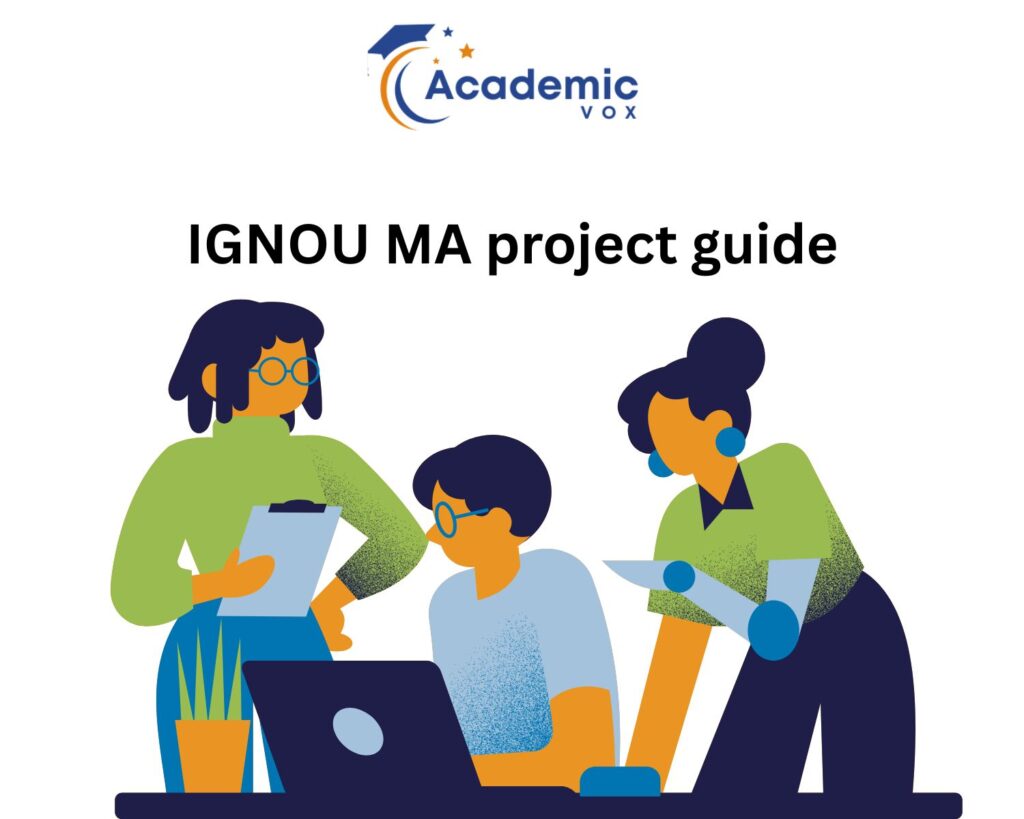The Complete IGNOU MA Project Guide for First-Time Students

Finishing your IGNOU MA project is a highlight of your academic career. If you’re a student pursuing a Master’s degree from the Indira Gandhi National Open University (IGNOU) and this is your first time working on a project, it’s absolutely natural to be confused or intimidated.
Don’t fret! This master guide will guide you through every step—from topic selection to submission so that you can finish your IGNOU MA project Guide confidently and accurately.
📘 What is the IGNOU MA Project?
The IGNOU MA project is a research-based task that you need to undertake in the last year of your course. The project provides an opportunity for students to delve deep into a topic of interest and showcase their scholarship and analytical acumen.
Applicable for:
Students of MA English, Sociology, Psychology, History, Public Administration, Economics, Education, etc.
Credits: 6 (comparable to one course paper)
🎯 Significance of the IGNOU MA Project guide
Here’s why your IGNOU MA project guide is important:
- It’s an academic requirement for the degree.
- Assists in developing research, writing, and analysis abilities.
- Enhances your knowledge of the topic.
- It lends greater value to your final grade.
- Equips you for research-based employment or higher studies.
🛠️ Step-by-Step Guide to Completing the IGNOU MA Project
Let’s break it down into simple, actionable steps:
1. Understand the Project Guidelines
Each program under IGNOU has certain project guidelines. Before you begin:
- Go to the official IGNOU website or your study center.
- Download the project handbook or guide applicable to your course.
- Carefully read the structure, format, and evaluation criteria.
✅ Pro Tip: Different subjects (e.g., Psychology vs. English) have different requirements. Follow the specific manual for your program.
2. Select the Appropriate Project Topic
Your topic must:
- Be relevant to your MA subject.
- Be interesting and manageable.
- Have sufficient material available for research.
Examples:
- MA Sociology: “A Study on Gender Roles in Urban Families”
- MA English: “Postcolonial Themes in Indian English Literature”
- MA Psychology: “Stress Management Techniques Among Working Professionals”
✅ Pro Tip: Don’t choose vague or too general topics. Focus narrowly for depth and clarity.
3. Identify a Qualified Supervisor
You have to work under the supervision of an approved project supervisor or guide. The guide must:
- Possess a Master’s or Ph.D. in a related subject.
- Be a faculty member of IGNOU or any recognized university.
You have to submit the supervisor’s biodata along with the project proposal for approval.
4. Prepare and Submit the Project Proposal
Prior to initiating the project, you need to submit a proposal (synopsis) and obtain approval from IGNOU.
Your proposal must contain:
- Project title
- Introduction and background
- Objectives of the study
- Research methodology (sample size, tools, methods)
- Scope and limitations
- Bibliography
✅ Forms to Submit with Proposal:
- Form P-1 (Project Proposal Proforma)
- Supervisor’s biodata
- Signed declaration
🔁 Send the proposal to your Regional Centre (RC), not the study center.
5. Wait for Proposal Approval
After submission, IGNOU can take 2 to 4 weeks to approve and process your project proposal. You can follow up by contacting your RC.
Don’t initiate your actual project work until you get the approval.
6. Conduct Your Research
After approval, start gathering data as per your research methodology.
Types of data:
- Primary data – via surveys, interviews, observations (especially for MA Psychology, Sociology)
- Secondary data – books, journals, articles, websites (for English, History type of subjects)
✅ Pro Tip: Maintain a notebook or digital file with proper notes and references.
7. Format Your Final Project Report
The project report must be cleanly laid out and professionally presented.
Suggested format:
- Title Page
- Certificate from Supervisor
- Declaration by Student
- Acknowledgement
- Table of Contents
- Introduction
- Objectives
- Methodology
- Data Analysis
- Findings & Interpretation
- Conclusion
- Bibliography
- Appendices (if needed)
✅ Pro Tip: Keep your report between 60–100 pages, or about 10,000–12,000 words.
8. Avoid Plagiarism
Plagiarism is strictly not allowed in IGNOU. Your project must be 100% original.
✅ Use plagiarism check tools (such as Grammarly or SmallSEOTools)
✅ Keep the similarity index below 15%
✅ Cite all your references properly
9. Proofread & Finalize Your Report
Before submitting:
- Recheck grammar and spelling
- Ensure all chapters are included
- Check that formatting is consistent
- Double-check your enrollment number and course details
✅ Print two or three copies for backup
10. Bind and Submit Your Project Report
Final hardcopy should be:
- On A4-size paper
- In Times New Roman, font 12
- 1.5 lines
- Spiral or soft/hardbound
Submit your project report to the Regional Centre with:
- One hardcopy of the project
- Signed forms (Declaration, Certificate, P-2 form)
- A CD or Pen Drive (if any)
11. Important Submission Dates
- For June TEE: Submit by 31st May
- For December TEE: Submit by 30th November
✅ Begin at least 3 months in advance of these dates to prevent last-minute hassles.
IGNOU MA Project FAQs
Q1. Can I submit my project via online mode?
👉 It is possible for certain RCs. Confirm with your regional center.
Q2. Is viva required?
👉 For certain courses like MA Psychology, viva is mandatory. Not for all.
Q3. Can I get someone to write my project for me?
👉 IGNOU encourages self-written, original work. Outsourcing is risky and can result in rejection.
Q4. What if my proposal is rejected?
👉 You’ll be informed, and you’ll need to revise and resubmit it.
🔍 Final Thoughts
Your IGNOU MA project guide is your opportunity to demonstrate your research and academic abilities. IGNOU MA project guide With the right planning, consistency, and guidance, you can successfully complete it—even if it’s your first time.
Don’t wait! Begin early, remain organized, and use this guide to make your IGNOU MA project guide for submission a breeze.
